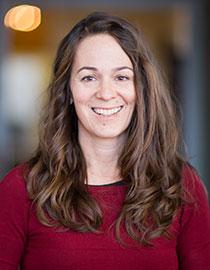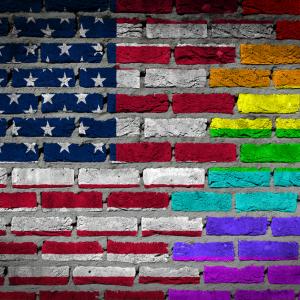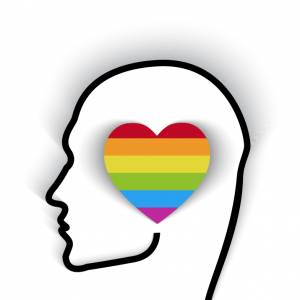
Michelle Clifton-Soderstrom is Professor of Theology & Ethics at North Park Theological Seminary and ordained to word and sacrament in the Evangelical Covenant Church. She is author of Angels, Worms, and Bogeys: The Christian Ethic of Pietism and co-author with David Bjorlin of Incorporating Children in Worship: Mark of the Kingdom. Michelle regularly blogs for Theoloqui, dedicated to reflection on questions of faith and identity in a diverse community of women. Michelle is a passionate advocate for people and groups who are marginalized in society and in the church. Her interests include virtue ethics, Christology, children, women’s participation, family ethics, and education for persons who are incarcerated. Michelle also works as an ethics consultant for Covenant Retirement Communities and serves on the editorial board for the Journal of the Society of Christian Ethics.
Posts By This Author
Resist Mass Incarceration — Through Education

Image via Johanna Goodyear / Shutterstock.com
Pell grants are otherwise open to the vast majority of students enrolled in college. The Department of Education claims that age, race, and field of study don’t compromise eligibility. Yet the Bureau of Justice Statistics estimates that black men constitute the highest rate of imprisonment by 3.8 to 10.5 times that of white men. And in the U.S., wide gaps persist in the educational attainment of black men.
Conventional data sources do not always link this growing education gap to prison rates for one main reason — statistics don’t include those who are incarcerated. This omission skews numbers around racial disparities in educational achievement by over 40 percent for black men.
The bottom line is that African American men are not only disproportionately overrepresented in our prison system; they are also disproportionately undereducated.
Given these numbers, we ought to be raising an obvious question: Can the Department of Education honestly claim that Pell grants are color blind?
Liberty and Justice for All?
Why Christians Can Rest in Peace with the SCOTUS Ruling on Same-Sex Marriage

MyImages - Micha/ Shutterstock
The Constitution was born within a worldview hospitable to transformation and open to corrections of injustices in letter and spirit. Examples abound: women’s right to vote, interracial marriage, the right to open legislative deliberations with prayer, and the right to education without segregation.
The Constitution has never claimed to be, in itself, the last word. Rather, it has claimed to be the first.
While I will not propose that every decision the Supreme Court has made has been for the betterment of all people, today’s ruling on same-sex marriage is an example of a nation reforming itself for the better.
In Over My Spirit: Faithful Dissent on Full LGBTQ Inclusion
My heart breaks. My head hurts. My spirit is broken on the question of LGBTQ inclusion in Christ’s church. In many ways, I am in right place in the Evangelical Covenant Church (ECC). We affirm the central role of friendship in our life together. We believe in the freedom to hold diverse theological views in the spirit of renewal. Yet, to draw from Martin Luther King Jr.’s phrase, freedom has a dull ring for me on this topic. Not only have some in my church family questioned the right to hold a minority view on LGBTQ questions, they have questioned the spirit of dissent.
The faithful pursuit of deeper answers in conversation with Scripture generates enormous fear, and this fear is understandable. Talking about LGBTQ questions is divisive in the current climate. Many believe the church has clearly spoken on this topic. Those ecclesial groups who have engaged it have lost churches and people. Understandably, leaders want to avoid this kind of thing happening under their watch. Still, pastors and lay people are on the front lines of ministering with and to their LGBTQ members — some of whom are clearly gifted for ministry and should be working themselves as pastors.
I could cite stories of bullying, statistics on youth suicides, or examples of micro-aggressions directed at the LGBTQ community on a daily basis. The evangelical world knows this, however, and they still insist on debating the theology. So here is where I, as a Christian ethicist, underscore the importance of faithful dissent. Why? For starters, Jesus did it all the time, and yes, he drove a lot of people crazy. For reference, see Matthew, Mark, Luke and John. The fact is, sometimes the majority view gets it wrong. We see it over and over throughout church history.
What does dissent look like? The ECC has a beautifully written report on biblical authority and Christian freedom that offers a set of reflections on the relationship between Scripture and the practice of theology. Five themes woven throughout this theological short and our archival documents offer helpful parameters for evangelicals discerning the parameters of faithful dissent. These five criteria offer up what I call “Best Practices for Faithful Dissent.”
In Over My Head: Freedom and LGBTQ Inclusion
I am in over my heart on the LGBTQ situation and the church. I am also in over my head. As a Christian ethicist who believes Scripture is the measure for matters of faith, doctrine, and conduct, I have to say my head hurts to the point that it aches. It aches because I know that how evangelicals have taught me about loving LGBTQ Christians is myopic, and we need to think through many questions anew.
There are themes I am clear on: the place of love, the importance of family, the image of God, the mystery of bodies, the centrality of children. When it comes to faith, doctrine, and conduct, I plan to occupy myself for a long time on these themes to engage the questions that I am still unclear on. These include: What is the ideal marriage? Who is deemed family? What kind of sex reflects the character of God?
A few years ago, my then 7-year-old son was flipping through a children’s Bible during church when he came to a picture of Jacob and Rachel. He looked up at me and challenged, “What’s this? One wife? Where are the rest of them?”
Clearly the illustrator had an interpretive lens for choosing not to portray the messiness of the patriarch’s family and children. Our world simplifies and sanitizes marriage and sex to the point that we evangelicals endanger the kind of complex thinking on family structures that Scripture itself narrates.
Fortunately I am in a church where questioning over your head is okay. Formed by people who first called themselves Mission Friends, the Evangelical Covenant Church (ECC) was birthed as a renewal movement in the late 1800s. We affirm our freedom in Christ to breathe life into our faith and ground our wisdom in the midst of complex ethical questions. The New Testament’s word on freedom sets the tone. John’s gospel tells us that if we continue going back to the word, we are his disciples. Those who receive Christ and have faith in his name are free to become children of God (John 1:12). Paul emphasizes that those who love Christ are new creations (2 Cor. 5:17). Galatians reminds us that freedom to live a new life is evidenced by such fruits as love, joy, peace, patience, kindness, goodness, faithfulness, gentleness, and self-control (Gal. 5:16-25). The letter to the Philippians promises that what God has begun will eventually be completed (Phil. 1:6).
In the midst of this celebrated freedom, the ECC acknowledges that it is a fragile gift. One of our forebears called this gift of freedom in Christ a “turtle without a shell” — how free it is to live unencumbered, yet how vulnerable to lose one’s protective layer. While I don’t want to say we Covenant evangelicals always use our freedom well, we do have historical precedent for thinking in morally complex ways.
In Over My Heart: Friendship and the LGBTQ Church
I am in over my heart on the LGBTQ situation within the church. As a Christian ethicist, life-long evangelical, and devoted Christ-follower, my heart aches to the point where it’s breaking. I have friends, students, and family who are gay or lesbian, and my faith in Christ would be worse off without them. Among other things, they witness faithfulness to God amidst exclusion and persecution.
Fortunately, I’m in a church where being in over your heart is a good thing. Now called the Evangelical Covenant Church, my denomination’s founders called themselves Mission Friends at the outset. We began as a renewal group in Sweden around the practices of reading Scripture and hospitality. We began out of a love for spiritual formation, and we countered the dominant culture by allowing all people to be readers of Scripture.
Scripture reading in rural Sweden developed as a subversive practice. Though they were few and poor, lowly and insignificant, our Covenant forebears enacted justice by crossing prohibitive lines of class, gender, and age. Three things sustained them: the Jesus of the word; a new spirit of freedom and joy; and the word of God and the sacraments. As a result, these faithful groups gained the capacity to hear God’s word through the hearts and minds of individuals who differed from one another.
This practice of diverse interpretation amongst lay people forged ahead through the strength of friendships. The name “Mission Friends” grew under the Psalm 119 banner, “I am a friend of all who fear thee,” and the people of the movement treasured friendship and unity in Christ above any doctrinal or confessional statements. They believed that friendship is not only the method of advancing the gospel — it is the heart of the gospel. Friendship reflects in the simplest terms the way that the Evangelical Covenant church does ecclesiology, or life together.


